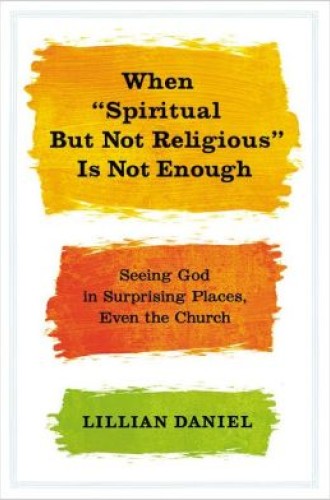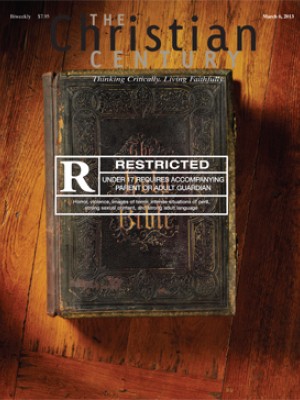In defense of church
Harry Emerson Fosdick said the preacher should preach in such a way that the listener wishes to come over later and visit the preacher in his office. Lillian Daniel has written a book that makes you wish she were your preacher—and that you could be seated next to her at a long, multicourse dinner party.
When “Spiritual But Not Religious” Is Not Enough is a feast of words—funny, ribald, tiptoeing to the edge of sarcasm, yet full of love and unflinching hope. Daniel has a pastor’s heart and is clearly a tender lover of the church, yet she writes with an edge that catapults her away from ever being dull or sappy. This isn’t a book so much as a smorgasbord of delicacies, complete with an essay, a brief piece that feels like a blog post gone viral, a lecture, and the sort of op-ed you print and hand to a friend.
Read our latest issue or browse back issues.
The primary theme of Daniel’s book is the wonder of the church—not some grand, impeccable, impressive church but the bumbling, homespun, mundane church, the one most of us actually belong to or drive past. Daniel harbors no illusions about this church: she is like a spouse, married for decades, who has shed all fantasy and misimpressions about the beloved. According to Daniel’s deft assessment, it is the endearingly laughable aspects of real church life that are essential to the life of faith.
In a surprising way, Daniel has served up a curious kind of apologetics—not the sledgehammer type that unsheathes rational arguments to crush disbelieving foes, but a warmer, anecdotal narrative of God’s sneaky habit of showing up, a cheeky defense of the fact that we need a church that is as wobbly, bewildered and uncouth as our own souls.
Daniel is a master of verbal portrayal, but she also brings in heartbreak, humor, humility and hope when she tells us about a sexton who looks like Eric Clapton, about being flummoxed in Spanish class, about driving in wintry conditions with a stranger, and about the moment when, at the age of ten, she learned that her parents were separating. We find God in a stray comment from a financial adviser, or in a yoga class, or in a congregation whose members make grand plans to celebrate their 75th anniversary only to discover they’ve miscounted and missed it the year before.
Denominations are devising panicked growth strategies to prop up a crumbling institution when perhaps they need to relearn how to tell mundane stories of when church and the church’s God genuinely mattered—and of how to simply love the place.
I’m not entirely sure who the target audience of this book is. Some chapters seem to be entirely about clergy, and Daniel articulates the life of pastors with a deep understanding. Other chapters will appeal to the people she paints as spiritual but not religious—and may even give them some comfort in not being religious. I would think that any person with even a mustard seed’s interest in God would delight in this book, although it will prove to be a special gift to those who, like Daniel herself, are weary of the church being slammed.
On the first page Daniel asks, “Now, can I vent for a minute?” Then she vents for much more than a minute, declaring that she is sick and tired of those who trash the church in the name of vapid spiritualities that can’t carry the freight. We who live in the church will want to holler “Amen!” This book will be a reassuring hug for those of us who are trying to do church as faithfully as possible in a culture where even the most pious people are criticizing it. Daniel’s words can instill courage in us so we can keep up the good fight, and with more joy. And more awareness, too, with our eyes trained to spot a surprise here or there.
My reservation about Daniel’s diatribe is that she seems to imply that goofball congregations are, precisely in their innocuously droll vapidity, faithful and necessary exemplars of the gospel. The sadder truth, which she never divulges, is that far too many congregations are just plain awful or downright harmful; they can bore you to death and produce sheer meanness. In some congregations worship is rigid and pointless, or it is cutesy and titillating but devoid of substance—the latter perhaps especially in churches that are successful and popular.
As Daniel exposes the thinness of the common critique of religion, the sorry truth is that lame thinking about God was born inside the church. Cynicism about the clergy and church life didn’t get dreamed up by fiat. People don’t arrive at a banal faith merely because of what happens outside of church. We’ve worked overtime for centuries to end up mired where we find ourselves. As Daniel so wonderfully puts it, after she sighs that she’s tired of stupid versions of Christianity and weary of trivial spiritualities, “I am really just tired of myself. In criticizing others in their faith, I hardly live up to the best in my own faith.” Those who irritate us expose our own flaws—“and this is why I can’t do this religion thing all by myself,” Daniel writes. “This is why I need a community.”
All of us lonely people do. The worldview of pop spiritualities really is a house built on sand. Can the church remember how to talk about God not merely in relation to puppy dogs but also in the face of scary forces of nature, to speak of God not just in chipper moments but in our darkest days, to encounter God not merely in the private heart of each individual but on the global, universal stage? Let’s plan a long dinner to talk about all of this and see if Daniel will join us (and sit near me) so we can remind ourselves why we do what we do, why it matters, and how patience with it all, and even puckish humor jabbed at ourselves, is genuine holiness.






